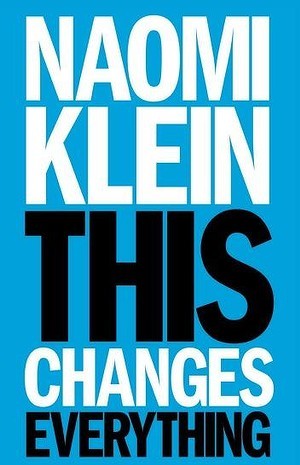Naomi Klien believes in the power of the people, and of collective action, to change the world. As outlined in "This Changes Everything: Capitalism vs The Climate" (2014), she writes: "Slavery wasn't a crisis for British and American elites until abolitionism turned it into one. Racial discrimination want a crisis until the civil rights movement turned it into one. Sex discrimination wasn't a crisis until feminism turned it into one. Apartheid wasn't a crisis until the anti-apartheid movement turned it into one. In the very same way, if enough of us stop looking away and decide that climate change is a crisis worthy of Marshall Plan levels of response, then it will become one, and the political class will have to respond, both by making resources available and by bending the free market rules that have proven so pliable when elite interests are in peril" (p. 6). A previous post covered the main arguments of the book, while this one focuses upon the author's vision for how change happens.
The author writes that "building a mass movement that has a chance of taking on the corporate forces arrayed against science-based emission reduction will require the broadest possible spectrum of allies" (p. 157). But, how to get there? Klien looks back to the history of the environmental movement, to understand how activism of past decades were more effective wherein struggles were not to narrow nor negative, they were "for greater community control, democracy, and sovereignty" (p. 309). Building alliances requires looking for commonalities, often extending beyond one's own specific interests.
Klien thus argues that, not only is climate change action going to require political change, it is advocacy for greater democracy that will build the alliances and allies for those changes to take place: "In the past, people committed to social change often believed they had to choose between fighting the system and building alternatives to it. So, in the 1960s, the counterculture splintered between those who stayed in cities to try and stop wars and bash away at inequalities and those who chose to drop out and live their ecological values among like-minded people on organic farms… Today's activists do not have the luxury of these choices even if they wanted them" (p. 403).
Naomi Klien argues that "only mass social movements can save us now. Because we know where the current system, left unchecked, is headed. We also know, I would add, how that system will deal with the reality of serial climate-related disasters: with profiteering, and escalating barbarism to segregate the losers from the winners. To arrive at that dystopia, all we need to do is keep barreling down the road we are on. The only remaining variable is whether some countervailing power will emerge to block the road, and simultaneously clear some alternative pathways to destinations that are safer. If that happens, well, it changes everything." (p. 450).
That movement, however, is not "some shiny new movement that will magically succeed where others failed. Rather, as the furthest-reaching crisis created by the extractivist worldview, and one that puts humanity on a firm and unyielding deadline, climate change can be the force – the grand push – that will bring together all of these still living movements. A rushing river fed by countless streams, gathering collective force to finally reach the sea" (p. 459). Furthermore, it is not a movement that can fully create its own destiny, it is a movement that needs to take advantage of the critical junctures, where opportunities for change are greater. "The real question is what progressive forces will make of that moment, the power and confidence with which it will be seized… The next time one arises, it must be harnessed not only to denounce the world as it is, but build fleeting pockets of liberated space. It must be the catalyst…" (p. 466).
1260 Hits
Featured Posts
Tags
Qatar
Policy
South Africa
Globalization
Ethics
Economics
Development Studies
Governance
Culture
Development
Leadership
Democracy
Colonization
Institutions
International development
Islam
Rural Development
Ethiopia
Interdisciplinary
Resilience
Racism
Human Rights
Climate change
Ideology
Gender
Books
Participation
Sustainability
Capitalism
Land
Ethnography
Power
Revolution
Poverty
Anthropology
Middle East
Food Security
Civil society
Conflict
Agriculture
Education
Africa
Colonialism
Politics
Post-doc
Migration
History
decolonization
Fellowship
Inequality

